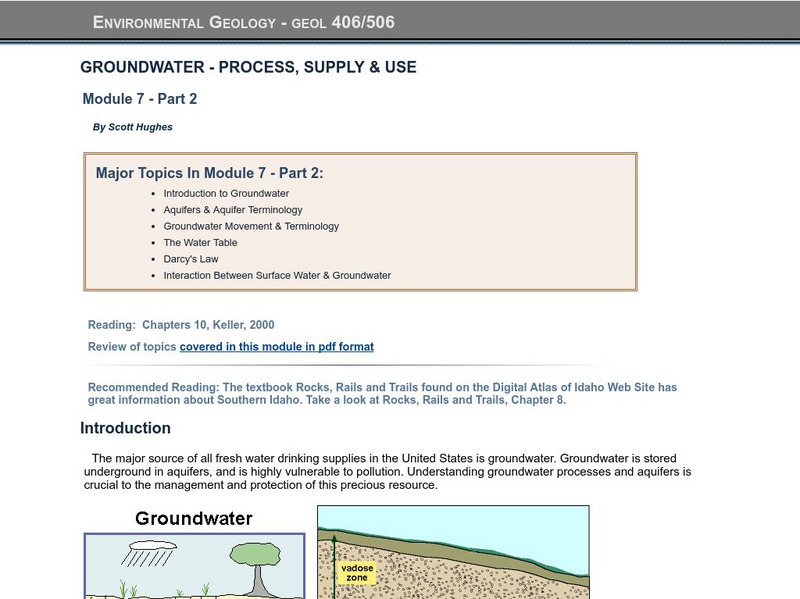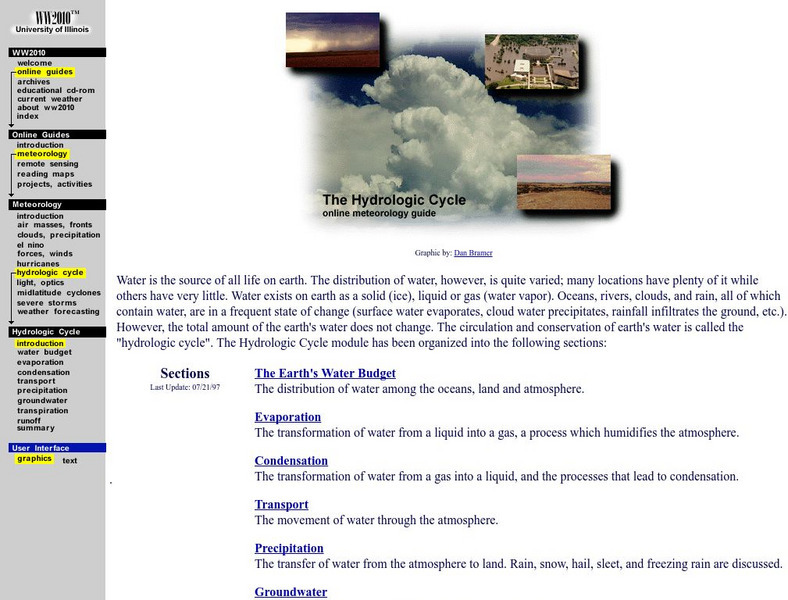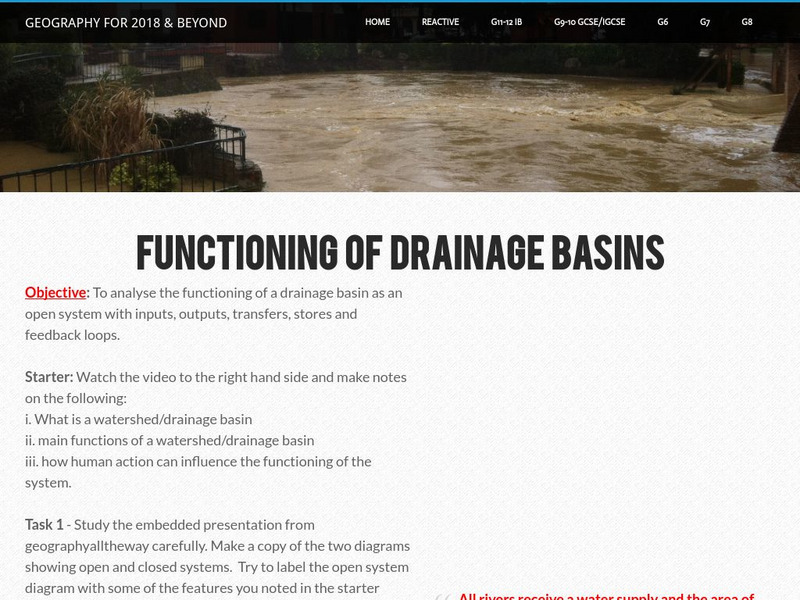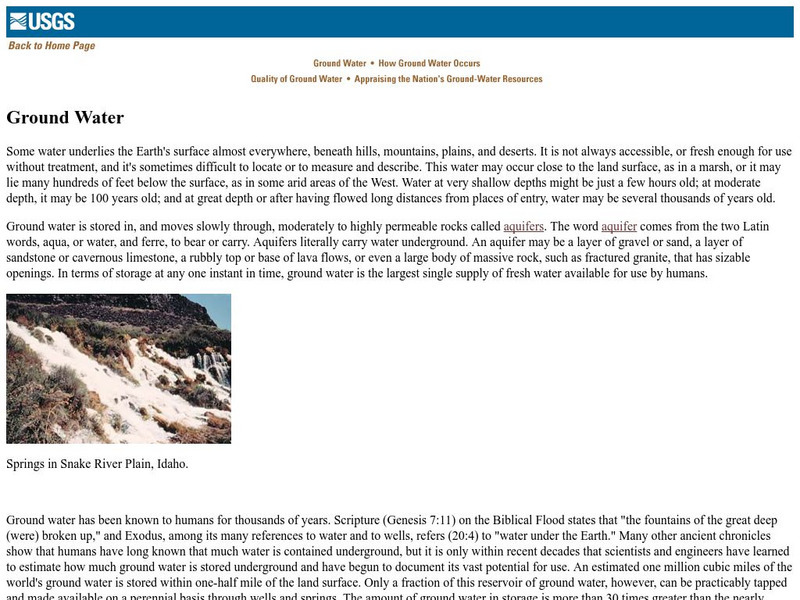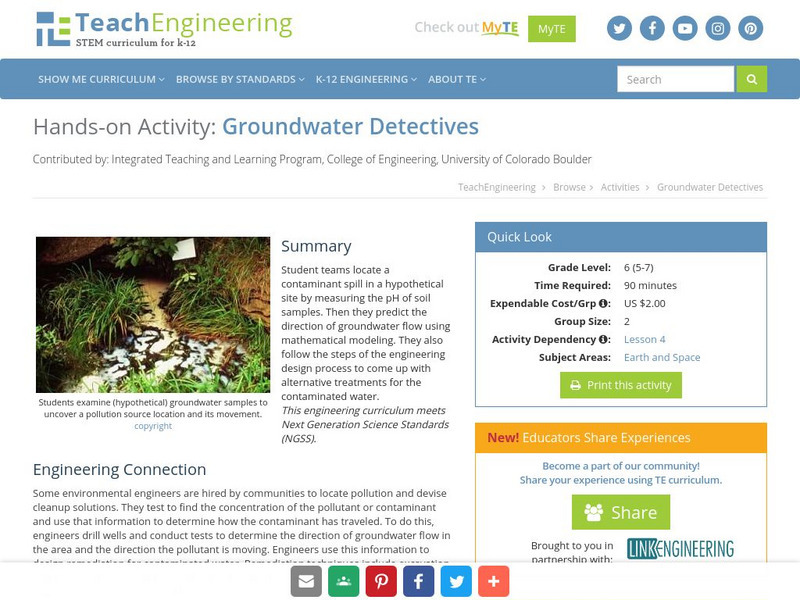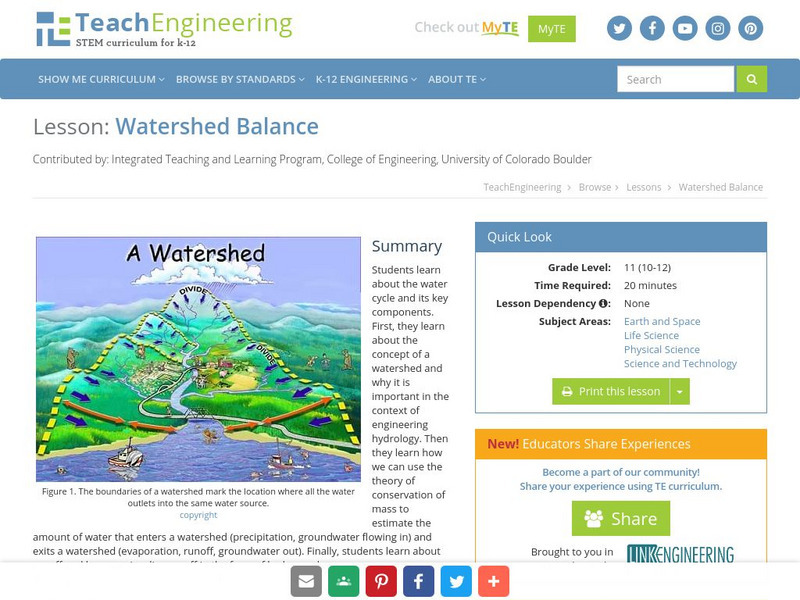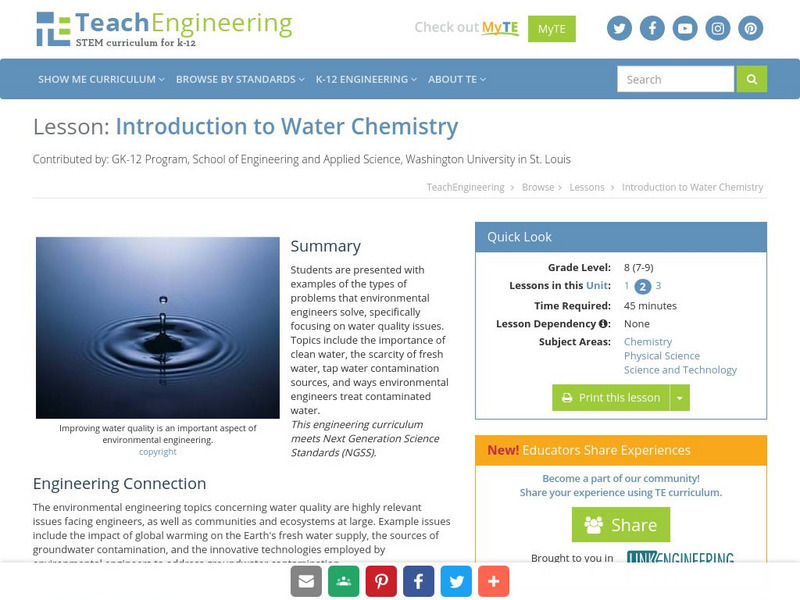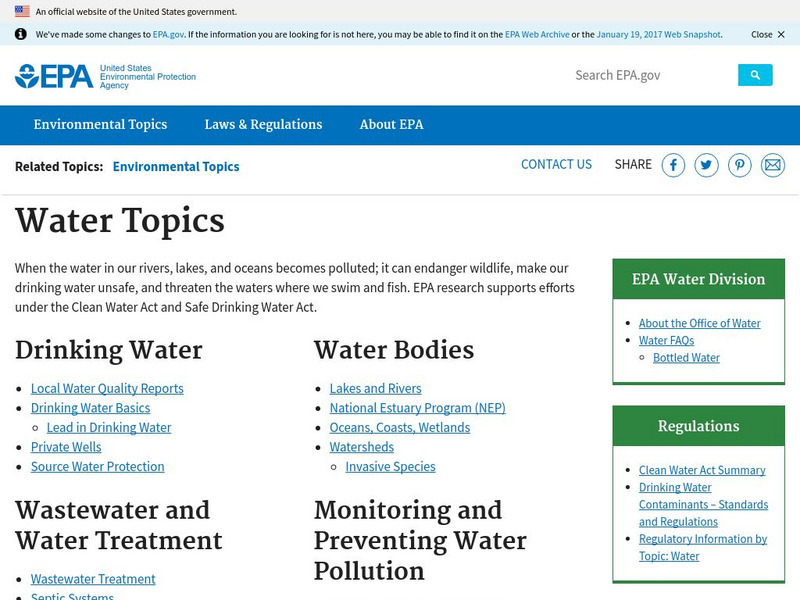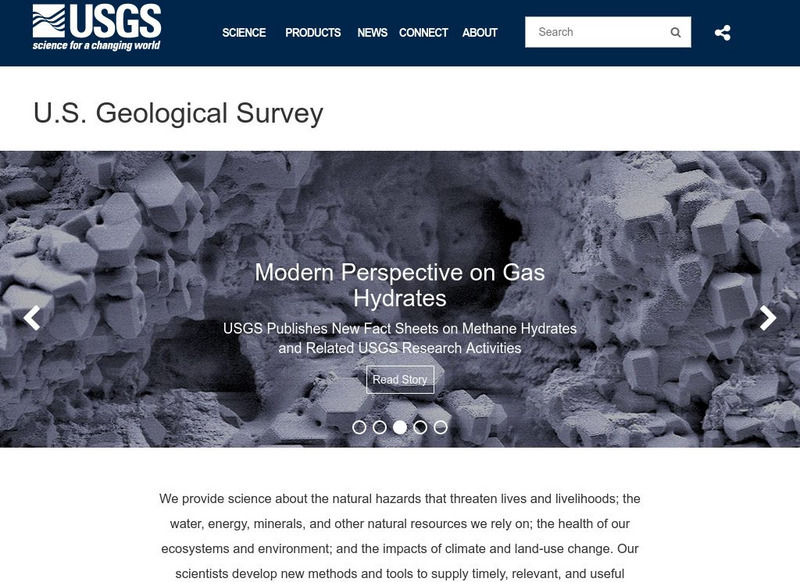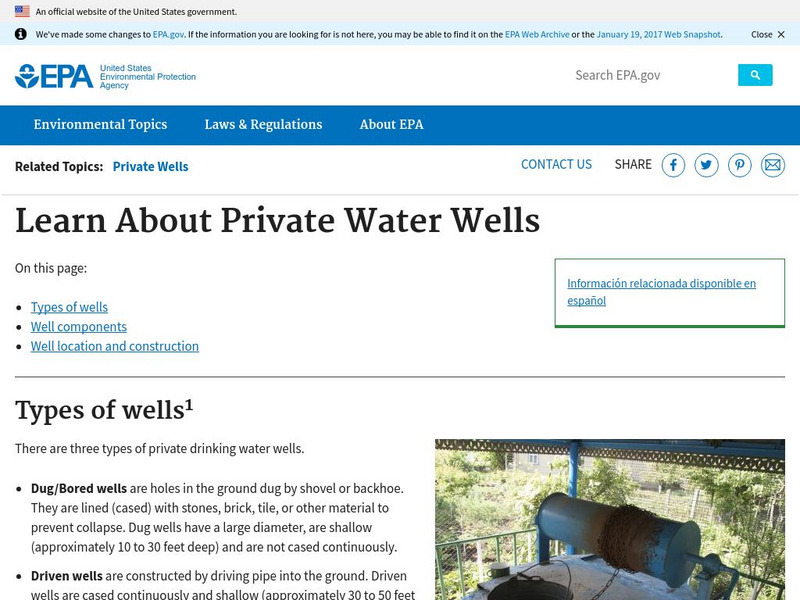Idaho State University
Idaho State University: Groundwater Process, Supply, and Use
Understand the vulnerability to polltuion the supply of drinking water in the United States has. Know what aquifers are and how groundwater is moved. Identify Darcy's Law and know how to apply it.
University of Illinois
University of Illinois Urbana Champaign: The Hydrologic Cycle
Water is the source of life on earth. It exists in many forms and is constantly changing. The circulation and conservation of earth's water is called the hydrologic (or water) cycle. Find out how water evaporates, condensates,...
Geographypods
Geographypods: Freshwater: Issues and Conflicts: Drainage Basins and Flooding
In this learning module, students learn how a watershed or drainage basin functions and the impact of human activities on them. Also covers groundwater, stream discharge, hydrographs, and the 2010 floods in Pakistan. Includes rich...
Other
Dcr.virginia.gov: A Resident's Guide to Sinkholes
This site describes what sinkholes are, how they form, problems associated with sinkholes such as flooding and pollution, and sinkhole locations. It discusses the two types of sinkholes, the main differences between karst and non-karst...
Other
Clean Ocean Action
This site defines and describes causes of ocean pollution. Easily navigated links to education, research, and current issues on pollution.
US Geological Survey
U.s. Geological Survey: Ground Water
Useful publication from the U.S. Geological Survey explains through text, images, and diagrams what groundwater is, where it is stored, how it occurs, and its quality.
US Geological Survey
Us Geological Survey: Groundwater: What Is Groundwater?
What is groundwater? Where does it fit into the water cycle? With the aid of a simple illustration, one is able to learn more about this topic. Includes link to a true-and-false quiz.
Georgia Department of Education
Ga Virtual Learning: Ap Environmental Science: Water Pollution and Treatment
Students learn about water management, treatment and purification- global issues that must be addressed to ensure a continued supply of safe water for the growing human population and for the organisms with which we share this planet.
TeachEngineering
Teach Engineering: Groundwater Detectives
Student teams locate a contaminant spill in a hypothetical site by measuring the pH of soil samples. Then they predict the direction of groundwater flow using mathematical modeling. They also use the engineering design process to come up...
TeachEngineering
Teach Engineering: Design, Build and Test Your Own Landfill
Students design and build model landfills using materials similar to those used by engineers for full-scale landfills. Their completed small-size landfills are "rained" on and subjected to other erosion processes. The goal is to create...
TeachEngineering
Teach Engineering: Natural and Urban "Stormwater" Water Cycle Models
Students apply their understanding of the natural water cycle and the urban stormwater water cycle, as well as the processes involved in both cycles to hypothesize how the flow of water is affected by altering precipitation.
TeachEngineering
Teach Engineering: Does Media Matter? Infiltration Rates and Storage Capacities
Students gain a basic understanding of the properties of media- soil, sand, compost, gravel- and how these materials affect the movement of water (infiltration/percolation) into and below the surface of the ground.
TeachEngineering
Teach Engineering: Watershed Balance
This instructional activity teaches the concept of a watershed and why it is important in the context of engineering hydrology. Young scholars learn about runoff and how we visualize runoff in the form of hydrographs.
TeachEngineering
Teach Engineering: Introduction to Water Chemistry
Students are presented with examples of the types of problems that environmental engineers solve, specifically focusing on water quality issues. Topics include the importance of clean water, the scarcity of fresh water, tap water...
Texas Education Agency
Texas Gateway: Human Impact
This tutorial provides some insight to the study of human impacts on water supplies.
US Environmental Protection Agency
Epa: Water Resources: Water Bodies
Learn about EPA's work to protect and manage water resources and what you can do to help.
US Geological Survey
U.s. Geological Survey
The U.S. Geological Survey reports on the latest news affecting the earth today, as well as providing a wealth of data, reports, and information.
US Environmental Protection Agency
Epa: Private Drinking Water Wells
Provides information on what to do after a flood to protect well water from contamination, the testing of private well water, and protecting private well water.
Smithsonian Institution
National Museum of Natural History: Ocean Planet: Water Pollution Toxic Materials
This site, from an archived Smithsonian exhibit, describes and illustrates the effects of toxic materials on wildlife in bodies of water.
TeachEngineering
Teach Engineering: All About Water!
Students learn about the differences between types of water (surface and ground), as well as the differences between streams, rivers and lakes. Then, they learn about dissolved organic matter (DOM), and the role it plays in identifying...
US Geological Survey
U.s. Geological Survey: Water Science for Schools
A collection of resources--pictures, maps, data, glossary--about water and the water cycle.
Vision Learning
Visionlearning: Earth Science: The Hydrologic Cycle: Water's Journey
Instructional module focusing on the hydrological cycle. Discussion includes the movement of water through the different reservoirs on earth and its impact on climate and weather patterns. Site also includes an interactive practice quiz...
Annenberg Foundation
Annenberg Learner: The Habitable Planet: Water Resources
Learn about water as a precious resource in danger of being depleted. Understand the roles that overuse and agricultural use play in the sustainability efforts of this essential resource. Includes video. [28:25]
Other
Uk Rivers Network: Finding Out About Water Pollution
Excellent site covers all types of water pollution. Hundreds of links including books, articles, organizations, specific topics.


